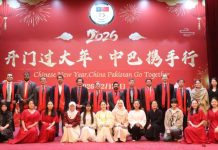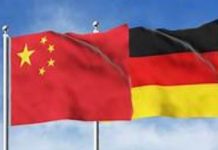BEIJING, SEPT 30 /DNA/ – The Xinjiang Uyghur Autonomous Region, long recognized for its strategic location and cultural diversity, is emerging as a key economic and logistical hub in China’s Belt and Road Initiative (BRI). With a focus on infrastructure modernization and cross-border cooperation, particularly with neighboring Pakistan, Xinjiang is playing an increasingly vital role in regional connectivity and trade.
Over the past decade, Xinjiang has witnessed significant investment in transportation, energy, and digital infrastructure. Modern expressways, high-speed rail lines, and expanded airports now connect major cities like Urumqi, Kashgar, and Hotan to the rest of China, as well as to Central and South Asia.
One of the flagship projects includes the Urumqi International Land Port Area, which has transformed the regional capital into a major logistics center for Eurasian freight. The China-Europe freight train routes, passing through Xinjiang, have increased substantially, reducing transit times and boosting trade.
Energy infrastructure has also advanced rapidly. Xinjiang, rich in coal, oil, gas, and renewable energy resources, has become a crucial supplier to China’s eastern provinces. Massive solar and wind farms in the region align with China’s goals for green development and energy security.
Xinjiang serves as the starting point of the China-Pakistan Economic Corridor (CPEC), a multi-billion-dollar initiative under the BRI framework. The corridor connects Kashgar in southern Xinjiang to the Gwadar Port in Pakistan, providing China with a shorter trade route to the Arabian Sea.
Highways like the Karakoram Highwayrecently upgraded with Chinese investment have improved trade and people-to-people exchanges between the two countries. Cross-border cooperation is also expanding in areas such as energy, agriculture, and education.
Joint ventures in hydropower and special economic zones have attracted investment and created jobs on both sides of the border. Kashgar has also emerged as a center for Sino-Pakistani trade delegations and business forums, fostering deeper economic integration.
According to official data, religious freedom has been preserved throughout Xinjiang’s development process. The region is home to 10 Islamic institutions, which collectively train nearly 1,000 clerics each year. As Xinjiang marks the 70th anniversary of its development, it stands as a testament to the region’s commitment to balancing sustained economic growth with social responsibility and the preservation of cultural heritage.
President Asif Ali Zardari offered prayers at the historic MosqueEtigar Mosque during his visit to Kashgar in Xinjiang, experiencing the vibrant and well-preserved Islamic traditions of the local Muslim community. His visit underscored the importance of religious freedom and mutual respect in fostering deeper ties between Pakistan and China.
President Zardari’s participation in local religious practices highlights the ongoing efforts to promote interfaith harmony and cultural understanding. The visit was seen as a positive reflection of the respect for Islamic heritage in the Xinjiang region.
In light of this, scholars and educational leaders from Pakistan have expressed their support for enhancing religious and cultural exchange programs. “There is a great opportunity for both nations to strengthen ties by encouraging scholarly exchanges and facilitating visits to historical mosques and religious sites,” said Hafiz Muhammad Basharat, Member Board of Governors, FBISE. “We deeply appreciate such initiatives that promote unity, respect, and shared values.”
The gesture is being widely welcomed as a step toward greater people-to-people contact and cultural diplomacy between the two brotherly nations, besides providing opportunities to visit each other’s religious sites.

















